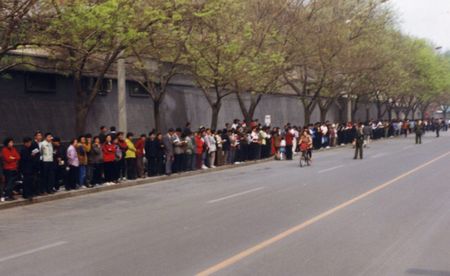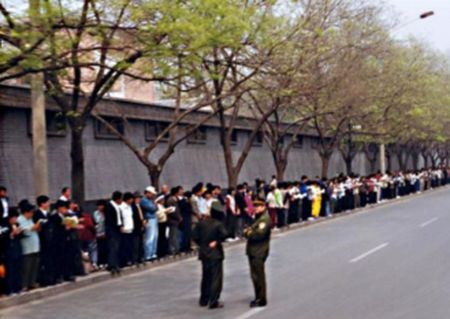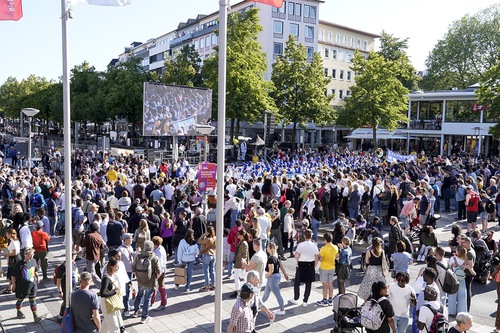(Minghui.org) In Western society “appeal” is a term that’s seldom used. Citizens have ways to express their opinions, and it’s not unusual for thousands of people to gather outside the president’s residence or a country’s capital building to protest.
On the other side of the Pacific Ocean, in China on April 25, 1999, over 10,000 practitioners went to the Central Appeals Office at the west entrance of Zhongnanhai to appeal for Falun Gong. They stood quietly on the footpath for hours but did not block pedestrians or vehicles. There were no signs, no one shouted slogans or made a scene. The police chatted among themselves and the matter was eventually resolved. This has been called “the largest, most rational and perfect appeal in Chinese history,” and some international media said, “The rationality displayed by both parties in the April 25 appeal at Zhongnanhai is unprecedented in Chinese history.”
Yet, today, many Chinese people’s impression of the incident is that Falun Gong practitioners attempted to attack Zhongnanhai and the event caused the Chinese Communist Party’s (CCP) subsequent decision to suppress the group. Some Westerners close to the CCP repeated the regime’s narrative: Falun Gong practitioners besieged the government.
Let’s clear up some misconceptions.

Who Is Correct: The State Affairs Petitions Office and Beijing Public Security Bureau? Or Jiang Zemin?
First, appeals are allowed in China and the Central Petitions Office is located at the west entrance of Zhongnanhai. The entrance to Zhongnanhai faces Xinhuamen on Changan street but not a single Falun Gong practitioner walked to Xinhuamen during the appeal. Thus, practitioners did not besiege Zhongnanhai.
Secondly, two months after the April 25 incident, the Central Petitions Office, State Appeals Office and Beijing Public Security Bureau published notices and said the appellants “gathered around Zhongnanhai.” They did not say they, “surrounded Zhongnanhai.”
The next day, on April 27, 1999, the director of the State Affairs Petitions Office said Falun Gong practitioners “gathered” in Beijing during an interview with a journalist from Xinhua News and pointed out, “The government never stopped any activities that improve health. People are allowed to have different opinions.” This shows that the appeal on April 25 was legal.
Two months later, on June 14, a public notice by both the Central and the State Affairs Petitions Office that no practice was ever banned by the government was simultaneously published in newspapers, TV and radio stations in China.
This indicates that it was undecided whether to pressure or persecute Falun Gong at that time. From information exposed years later, 6 out of 7 members of the Politburo Standing Committee opposed suppressing Falun Gong. It was then CCP leader Jiang Zemin who claimed the April 25 appeal by Falun Gong practitioners was “besieging Zhongnanhai” in an article published in People’s Daily on August 13, 1999.

Did Falun Gong Challenge the CCP or Did Jiang Zemin Abuse His Power?
Why did Falun Gong practitioners gather near the political heart of the CCP? Were they challenging the regime’s power? Was this the fundamental reason that led to the regime to make up its mind to eradicate the group?
In December 1998, Shanghai TV station broadcast the following: “Early this morning, nearly 10,000 Falun Gong enthusiasts in the city gathered at the Shanghai sports centre to promote the exercises. The founder, Mr. Li Hongzhi first taught Falun Gong publicly in 1992 and since then the practice has become popular among people in the country. The unique teachings of Falun Gong has been a breath of fresh air and to date, people in all parts of the country as well as Hong Kong, Macau and Taiwan have spontaneously formed groups to practice the exercises together. Falun Gong has also spread to Europe, America, Australia and Asia. Approximately 100 million all over the world are practicing Falun Dafa. This is a report by our station’s journalist.”
Falun Gong was first taught publicly in 1992. Mr. Li Hongzhi held the first introductory class in Changchun on May 13, 1992. The practice is based on the principles, Truthfulness, Compassion, Forbearance, and include five sets of gentle exercises. In May 1998, the country’s top sports bureau conducted a thorough investigation of Falun Gong. In September, a small team of medical experts examined 2,553 practitioners in Guangdong. The results show the practice is 97.9 percent effective in improving health.
Among the practitioners were retired military officers, high-ranking CCP officers, military officers, ordinary workers, university lecturers and so on. Falun Gong spread widely by word of mouth and received good reviews within a short period of time.
Falun Gong did not begin in China as a religion but as a form of qigong. Therefore, among high-ranking CCP officers, many thought qigong was a form of exercise that improved physical health and made a big deal by raising it to the level of ideology.
Jiang Zemin the then Chinese president thought Falun Gong was competing with him for attention as a result of its growing popularity. As early as 1996, Jiang authorised China’s public security to pay attention to the activities of Falun Gong practitioners.
In 1997, 1998, there were incidents of Falun Gong practitioners being unjustly treated in all parts of the country. In 1999, several practitioners in Tianjin were arrested and Falun Gong books were banned from being published. In certain areas, people were not allowed to practice openly. If things continued like this, the practice faced the risk of being outlawed. A group of practitioners who benefited from practicing Falun Gong decided to go to Beijing to appeal, hoping to guarantee a peaceful, safe cultivation environment.
Although then premier Zhu Rongji had an amicable meeting with practitioners during the April 25 appeal and practitioners departed quietly afterwards, Jiang Zemin soon overturned the results and on July 20, 1999, two months later, launched a major arrest of Falun Gong practitioners and a brutal persecution that has continued till today, 26 years later.
Jiang Zemin’s False Accusations Led to a Breakdown of China’s Declining Moral Values
After 1999, China’s appeals system and regulations became twisted.
The CCP uses its petition system to give people who have been unjustly treated a last shred of hope. However, what awaits them is a huge policing network called the “Fengqiao experience” (mobilising the masses in order to “strengthen dictatorship over class enemies.” The CCP routinely targets certain groups or individuals.)
In the past 26 years, Chinese citizens try to safeguard their rights through the appeals path designed by the CCP. There are all sorts of reasons they appeal, such as forced evacuation, fake vaccines, suing corrupt officials, reporting on bullies and so on.
But what are the consequences? It is well known that the CCP deploys a large number of people and money to intercept appeals, and then throw the appellants into jail, labor camps, or other types of imprisonment. The starting point for the complete collapse and darkening of China’s appeals system can be traced back to Jiang Zemin’s false accusations of Falun Gong practitioners’ peaceful appeal on April 25, 1999.
Copyright © 1999-2025 Minghui.org. All rights reserved.



